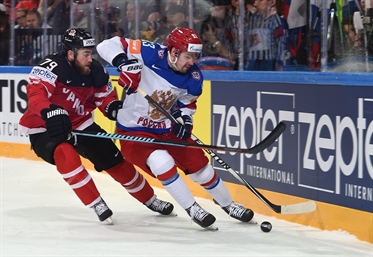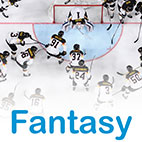Duel for the ages
Duel for the ages
Get set for another CAN-RUS classic

 Back at it: Canada's Ryan O'Reilly and Russia's Viktor Antipin played each other in the gold medal game in 2015. Photo: Richard Wolowicz / HHOF-IIHF Images
Back at it: Canada's Ryan O'Reilly and Russia's Viktor Antipin played each other in the gold medal game in 2015. Photo: Richard Wolowicz / HHOF-IIHF Images
With the two traditional hockey superpowers meeting in the semi-finals of the 2017 IIHF Ice Hockey World Championship, only the skeptics – and possibly some North Americans – would argue that this isn’t the biggest international rivalry in our sport.
“I think if you look at the history of the game, that’s where Canada-Russia really is a big deal,” said Team Canada coach Jon Cooper after advancing with a 2-1 win over host Germany in Cologne. “The USA has closed the gap to where there really is no gap anymore, but let's go back to the 60’s, 50’s, 70’s all that. It’s just Russia-Canada. I don’t think any more needs to be said.”
Yet in fact, there’s lots to be said about Saturday’s battle. To put it in context, the Russians have gotten back on track at the World Championship in recent years, capturing gold in 2008, 2009, 2012 and 2014. Yet a gaping hole persists in their Olympic resume: they haven’t taken gold since 1992.
Canada, meanwhile, is the reigning two-time champion at both the Olympics (2010, 2014) and Worlds (2015, 2016). The Russians have had to swallow a lot from their archrivals recently: watching the Canadians celebrate in Sochi, getting trounced 6-1 in the 2015 Worlds final in Prague, seeing Russian president Vladimir Putin handing out the gold medals to Canada at last year’s Worlds in Moscow, and getting eliminated 5-3 in the 2016 World Cup of Hockey semi-finals in Toronto.
After four straight Worlds losses to Russia between 2008 and 2011, the Canadians have seemingly figured out how to counteract the skill and speed of the Sbornaia, who settled for bronze in 2016. A win on Saturday would put Canada in position to become the first nation since the Czechs (1999-2001) to three-peat.
“I’ve played against Russia a million times,” said Canada’s Matt Duchene, preparing to face an opponent that has a 38-9 goal differential and blanked the Czechs 3-0 in the quarter-finals in Paris. “They’re a high-octane offence. They like to make plays. If you play into their transition game, they’re gonna crush you. We want to play them in their end, make them play defence, and be stingy defensively when they have the puck and stay out of the box. Their power play is clicking as well as ours is right now, so we don't want to get into a track meet with them. If we play the way we can play, it’ll give us the best chance to win, hopefully.”
Could it come down to goaltending? Historically, Canada has produced more quality netminders, but this year, the Russians should have the edge. Andrei Vasilevski leads the tournament with three shutouts. A 2014 World Champion and three-time World Junior medalist, Vasilevski has played 12 NHL playoff games with the Tampa Bay Lightning, including the 2015 Stanley Cup final, at age 22. Like Vasilevski, Calvin Pickard, 25, is coming off his first year as an NHL starter and played 50 games this season. But the Canadian had a tougher go confidence-wise with the last-place Colorado Avalanche (2.98 GAA, 90.4 save percentage), although suiting up for Canada at these Worlds may have helped.
A Canadian defence that looked relatively quiet offensively after the loss of Tyson Barrie to an off-ice leg injury has been jumpstarted by the addition of Colton Parayko. The big St. Louis blueliner has excelled with three power play goals in just four games. Mike Matheson, named Best Defenceman last year, is also shining with six points and a team-high +7 plus-minus. When you factor in 2014 Olympic champion Marc-Edouard Vlasic, the Canadians have the overall edge on the blue line. Even though the Russian D-men have played well as a group – partners Vladislav Gavrikov and Bogdan Kiselevich are tied for second in tournament plus-minus at +9 – they haven’t yet faced the kind of forecheck Canada can muster. They will need to make quick outlet passes and not turn the puck down low if Russia is to prevail.
Up front, both teams boast four lines that are capable of putting the puck in the net. The Russians have showed off their skills a little more, with Artemi Panarin (14 points) and Nikita Kucherov (13 points) atop the tournament scoring derby. However, Nathan MacKinnon (12 points) has been firing lasers on the power play, and Mitch Marner’s playmaking skills (11 points) on this big stage have been a revelation. As Duchene alluded to, Canada must avoid giving Russia too many chances off the rush, be it 2-on-1’s or breakaways. Early Canadian goals combined with physical presence, conversely, have been known to break Russia’s spirit.
Cooper faces an interesting situation that Russian coach Oleg Znarok does not: he has three of his key Tampa Bay Lightning players on the other side in Vasilevski, Kucherov, and Vladislav Namestnikov. Will he exploit their tendencies as Canada pushes toward a three-peat?
“You’re always pulling for your players,” said Cooper. “As this tournament has gone on, I’ve been pulling for Kuch and Vladdy, and I’ve been watching Vasy play goal, and I’m really excited for the way he’s playing. But for one game, I’m not gonna be pulling for him.”
If Canada wins gold this year, it will tie Russia for the most all-time golds at this tournament (27), if you include the Soviet Union era and Olympics that counted as World Championship results.
Back to Overview
































































































